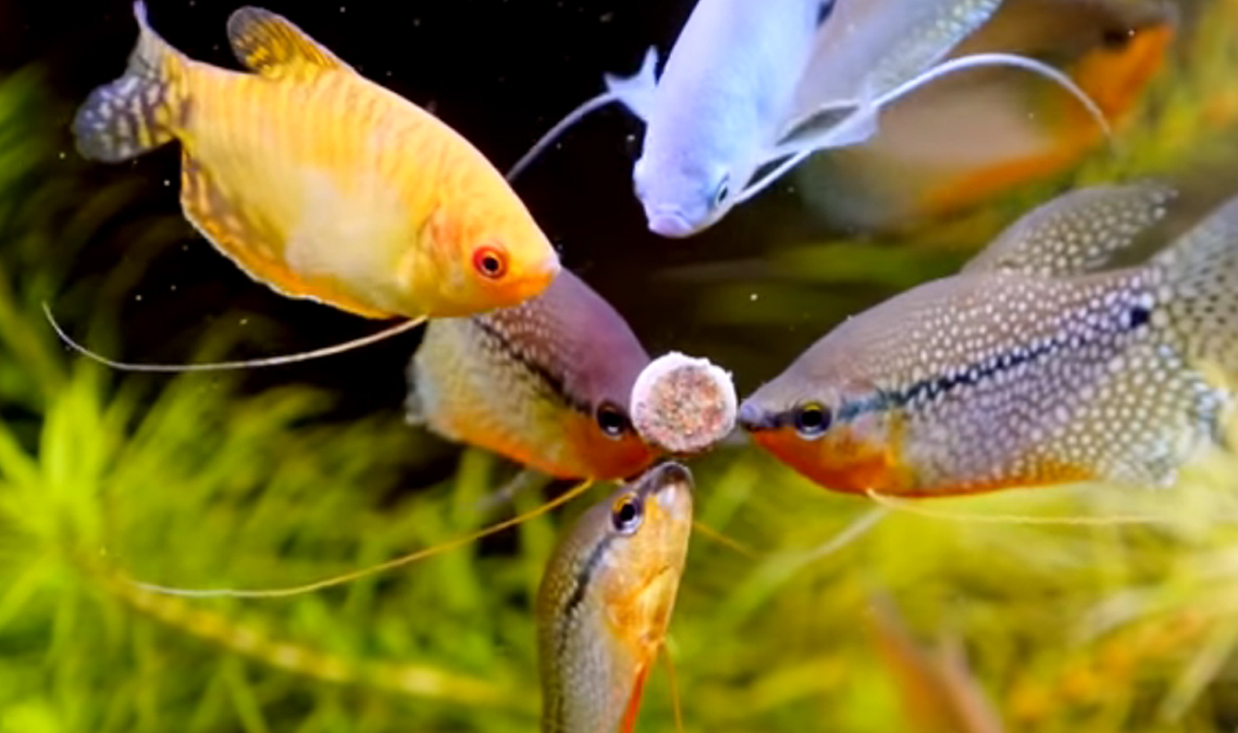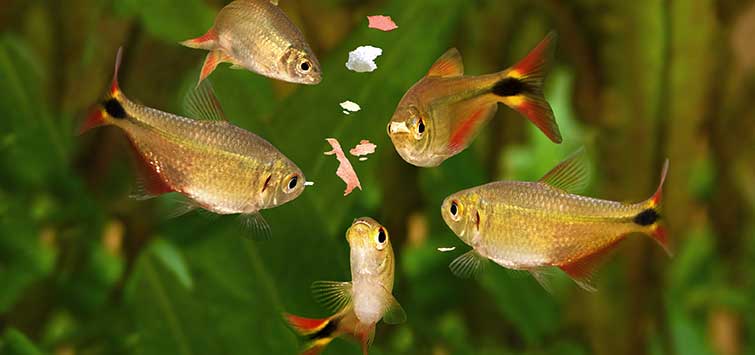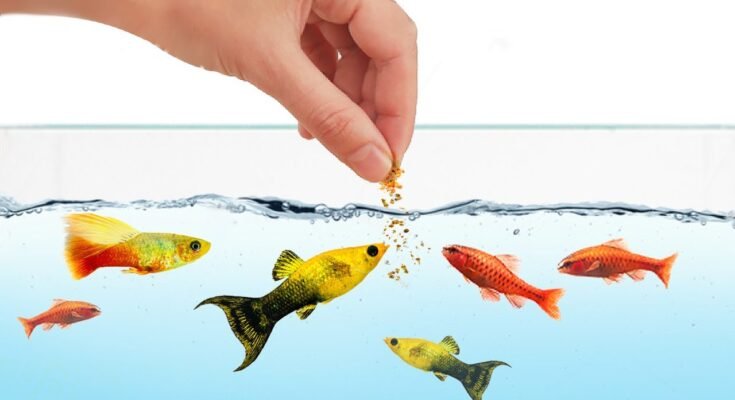Feeding tropical fish is both an art and a science. It’s crucial for their health and happiness.
Tropical fish are known for their vibrant colors and lively behavior. Proper feeding is essential to maintain their beauty and well-being. Understanding what to feed them ensures they thrive in your aquarium. Fish food comes in various forms like flakes, pellets, and frozen options.
Each type caters to different species and their specific dietary needs. Overfeeding can cause health issues and dirty water, while underfeeding leads to malnutrition. Striking the right balance is key. This guide will help you make informed decisions about feeding your tropical fish. Keep reading to learn tips and tricks for a healthy, happy aquarium.
:strip_icc()/Fisheseating-GettyImages-940731024-5c2814d2c9e77c0001b0ab83.jpg)
Credit: www.thesprucepets.com
Choosing The Right Food
Choosing the right food for your tropical fish is crucial for their health and vitality. With the variety of tropical fish foods available, it can be overwhelming. Understanding the types of food and how to read labels can make this task easier.
Types Of Tropical Fish Food
There are several types of tropical fish food available. Each type serves a different purpose and suits different species.
- Flake Food: Ideal for surface feeders. Easy to use and suitable for most fish.
- Pellet Food: Suitable for larger fish and bottom feeders. Sinks slowly to reach all levels of the tank.
- Freeze-Dried Food: High in nutrients. Great for occasional treats.
- Frozen Food: Preserves nutrients well. Thaw before feeding.
- Live Food: Mimics natural diet. Includes brine shrimp and bloodworms.
Choosing the right type of food depends on your fish’s feeding habits and nutritional needs.
Reading Labels
Reading the labels on fish food packages can provide essential information about the contents and nutritional value.
- Ingredients: Look for high-quality ingredients. Avoid foods with fillers.
- Protein Content: Protein is vital for growth and health. Check the percentage.
- Vitamins and Minerals: Ensure the food has essential vitamins and minerals.
- Preservatives: Natural preservatives are better. Avoid artificial ones.
Understanding labels helps you choose the best food for your tropical fish. Always opt for foods with clear, detailed labels.
Feeding Schedules
Creating a proper feeding schedule is vital for tropical fish health. Feeding schedules ensure fish get the right nutrients at the right time. Let’s break down the key aspects of feeding schedules.
Frequency Of Feeding
Tropical fish need regular feeding. Most adult tropical fish thrive on two feedings per day. Young fish, on the other hand, may require more frequent feedings. Aim to feed young fish three to four times daily. Always monitor your fish’s behavior and appetite to adjust feeding frequency.
Portion Sizes
Portion sizes play a crucial role in maintaining fish health. Overfeeding can lead to water pollution and health issues. Underfeeding, however, can stunt growth. A good rule of thumb is to feed your fish only what they can consume in two to three minutes. Adjust portion sizes based on the size and species of your fish.
| Fish Size | Portion Size |
|---|---|
| Small Fish | Pinch of food |
| Medium Fish | 1/4 teaspoon |
| Large Fish | 1/2 teaspoon |
Remember, it’s better to underfeed than overfeed. Always remove uneaten food to keep the tank clean. This helps maintain water quality and fish health.
Understanding Fish Behavior
Feeding tropical fish involves more than just providing food. Understanding fish behavior is crucial. It helps ensure their health and happiness. Observing how they act can give insights into their needs. Two important aspects are recognizing hunger and spotting overfeeding signs.
Recognizing Hunger
How can you tell if your fish are hungry? Watch for these behaviors:
- Increased activity near the water surface
- Aggressive interactions with other fish
- Pacing or swimming in a frantic manner
These signs often indicate that your fish are ready to eat. Feed them small amounts twice a day. This routine keeps them healthy and prevents overfeeding.
Overfeeding Signs
Overfeeding can harm tropical fish. Look for these signs to avoid it:
- Uneaten food sinking to the bottom
- Cloudy water due to excess food particles
- Algae blooms from nutrient overload
Overfeeding leads to poor water quality. It can stress the fish and make them sick. A good practice is to feed only what they can consume in 3-5 minutes.
| Behavior | Possible Cause |
|---|---|
| Swimming near surface | Hunger |
| Uneaten food | Overfeeding |
| Cloudy water | Overfeeding |
Understanding these behaviors helps maintain a healthy environment. Keep a close eye on your fish. Happy fish make for a vibrant aquarium.

Credit: www.fishkeeper.co.uk
Special Dietary Needs
Tropical fish have unique dietary needs. Understanding these needs ensures a healthy aquarium. Different species require different diets. Some fish are carnivores, some are herbivores, and others are omnivores. Knowing what to feed each type is crucial.
Carnivores Vs Herbivores
Carnivorous tropical fish eat meat. Their diet includes insects, smaller fish, and shrimp. Popular carnivores are bettas and angelfish. Feed them high-protein foods. Options include brine shrimp, bloodworms, and daphnia.
Herbivorous tropical fish eat plants. They need a diet rich in vegetable matter. Common herbivores are plecos and mollies. Feed them algae wafers, spirulina flakes, and blanched vegetables like zucchini and spinach.
Feeding Bottom Dwellers
Bottom dwellers have different needs. They live and feed near the tank’s bottom. Examples include catfish and loaches. Ensure food reaches them. Use sinking pellets and tablets.
| Fish Type | Diet | Recommended Foods |
|---|---|---|
| Carnivores | Meat | Brine shrimp, bloodworms, daphnia |
| Herbivores | Plants | Algae wafers, spirulina flakes, blanched vegetables |
| Bottom Dwellers | Mixed | Sinking pellets, tablets |
Ensure a balanced diet. Overfeeding can cause water pollution. Monitor your fish’s health and adjust their diet as needed.
Incorporating Live Foods
Feeding tropical fish with live foods can greatly enhance their health and vitality. Live foods mimic the diet fish would have in the wild, providing them with essential nutrients. This addition to their diet can make a noticeable difference in their behavior, color, and overall well-being.
Benefits Of Live Foods
Live foods offer numerous benefits for tropical fish. They are rich in proteins and nutrients that are crucial for growth and development. Live foods also stimulate natural hunting behaviors, which can be beneficial for their mental health. Additionally, they help in boosting the fish’s immune system, making them more resistant to diseases.
Safe Live Food Options
Choosing safe live food options is essential for the health of your tropical fish. Some excellent choices include:
- Brine Shrimp: High in protein and easy to culture at home.
- Daphnia: Also known as water fleas, rich in vitamins and minerals.
- Bloodworms: A favorite among many fish, providing a high-energy diet.
- Microworms: Ideal for small fish or fry, easy to maintain.
Ensure that the live foods are sourced from reputable suppliers to avoid introducing diseases into your aquarium.
Supplementing Diets
Feeding tropical fish the right diet is important. Sometimes, regular fish food is not enough. Supplementing diets ensures that your fish get all they need to stay healthy and colorful. This section will guide you on how to do that effectively.
Vitamins And Minerals
Tropical fish need essential vitamins and minerals to thrive. These nutrients support their immune system and overall health. Here’s a list of key vitamins and minerals:
- Vitamin C: Boosts the immune system and helps with wound healing.
- Vitamin D: Supports bone health and growth.
- Vitamin E: Important for reproduction and cell function.
- Calcium: Necessary for bone and scale development.
- Iron: Helps with oxygen transport in the blood.
Ensure your fish food contains these vitamins and minerals. Look at the ingredients list to confirm.
Using Supplements
Sometimes, fish food alone does not provide enough nutrients. In such cases, using supplements can help. Here are some tips on how to use them:
- Liquid Supplements: Easy to add to the water. They dissolve quickly and are absorbed by the fish.
- Gel Supplements: Can be mixed with food. They stick to flakes or pellets, making them easy to eat.
- Powdered Supplements: Sprinkle on food. Ideal for adding extra vitamins and minerals.
Always follow the dosage instructions on the supplement packaging. Over-supplementing can be harmful to your fish.
Using a combination of these methods ensures your tropical fish receive a balanced diet. Healthy fish are happy fish. And happy fish are a joy to watch.
Feeding During Illness
Tropical fish can fall ill just like any other pet. Feeding them correctly during this time is crucial. Proper nutrition can help them recover faster. It also ensures they do not lose strength.
Sick Fish Care
Sick fish need special care. Isolate the ill fish in a quarantine tank. This helps prevent the spread of disease. Keep the water clean and at the right temperature.
Offer food in small amounts. Sick fish may not eat much. Remove any uneaten food to keep the water clean. Ensure the fish has a stress-free environment.
Medicinal Foods
Medicinal foods can help treat sick fish. These foods contain added vitamins and medicines. They boost the fish’s immune system. They also provide necessary nutrients.
Here is a table of common medicinal foods:
| Food Type | Benefits |
|---|---|
| Garlic-Infused Food | Boosts immune system, fights parasites |
| Medicated Pellets | Treats internal infections |
| Vitamin-Enriched Flakes | Provides essential vitamins |
Follow the instructions on the packaging. Do not overfeed medicinal foods. Overfeeding can cause water quality issues.
A sick fish needs extra attention. The right food can make a big difference. Keep an eye on their eating habits. Make adjustments as needed.
Maintaining Water Quality
Maintaining water quality is vital for the health of your tropical fish. Clean water ensures your fish live in a healthy environment. This section explores two key aspects: cleaning uneaten food and balancing feeding and filtration.
Cleaning Uneaten Food
Uneaten food can quickly pollute your aquarium. It decays, producing harmful toxins. To prevent this, remove uneaten food after feeding.
- Use a net or siphon to clean the tank.
- Feed small amounts to avoid leftovers.
- Observe your fish during feeding to judge the right quantity.
Cleaning uneaten food keeps the water clean. It also prevents bad odors and algae growth. Regular cleaning is crucial for maintaining water quality.
Balancing Feeding And Filtration
Balancing feeding and filtration helps maintain a healthy tank. Overfeeding leads to excess waste. This can strain your filtration system.
- Feed your fish once or twice daily.
- Choose high-quality food for better nutrition.
- Adjust the filtration system to handle the waste.
A good filter removes debris and toxins. Clean the filter regularly to ensure it functions properly. Balance is key to a healthy aquarium.
| Tips for Water Quality |
|---|
| Feed small amounts |
| Remove uneaten food |
| Maintain your filter |
Maintaining water quality involves regular cleaning and proper feeding. Your tropical fish will thrive in a clean and balanced environment.

Credit: www.tfhmagazine.com
Frequently Asked Questions
How Often Should I Feed Tropical Fish?
Feed tropical fish once or twice daily. Overfeeding can lead to water pollution. Adjust portions based on fish size and species.
What Type Of Food Is Best For Tropical Fish?
Use high-quality flake or pellet food. Supplement with frozen or live food occasionally. Ensure variety for balanced nutrition.
Can Tropical Fish Eat Vegetables?
Yes, tropical fish can eat vegetables. Blanched spinach, peas, and zucchini are good options. Remove uneaten vegetables after a few hours.
How To Prevent Overfeeding Tropical Fish?
Feed small portions and observe fish eating. Remove uneaten food after five minutes. Use feeding rings or automatic feeders for consistency.
Conclusion
Feeding tropical fish correctly is crucial for their health and happiness. Consistent feeding schedules and balanced diets ensure vibrant, active fish. Avoid overfeeding to keep the tank clean and fish healthy. Observe your fish to understand their needs better. Proper nutrition helps them thrive and display their best colors.
Make feeding time enjoyable for both you and your fish. With these tips, you can maintain a beautiful, lively aquarium. Happy fishkeeping!



